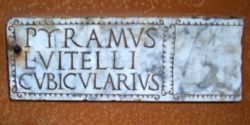Build Your English Vocabulary by Learning Latin Roots

Healthy Latin Roots Grow Large Vocabulary Trees
Though classified as a "dead" language, meaning that it is no longer spoken as a native language, Latin does live on in the words that we use every day in our written and verbal communication.
While there is continual debate regarding the actual percentage of English words that are derived from Latin, it is without question, a substantial amount. In fact, in just the last two sentences, 14 out of 21 of the words having more than one syllable are descended from Latin. Pretty interesting, eh?
I took three years of Latin when I was in college, and I was amazed at how much more extensive my vocabulary became during that time. While it is hard to quantify that, the telling point for me was not having to consult my thesaurus as often while I was writing my term papers. That may sound like a minor issue, but the last thing you want to be doing at 2 am is paging through Roget's yet again. Not that I was ever up doing papers at the last minute, of course. *cough*
In this lens, I will give a brief introduction to the different word parts (prefixes, suffixes and roots) and explain how learning some common Latin derivatives can greatly increase your vocabulary. This is especially important to those studying for college entrance exams (SAT, GRE, MCAT, etc.).
Even if you are not studying for an exam of some sort, it is still useful to expand your language skills and keep your mind actively learning. For others learning English as a second language, familiarity with common Latin roots and affixes can help speed up the process of language acquisition.
Carpe Diem!

Vocab Nugget of the Week
Come back each week to learn a new Latin part and see your vocabulary increase!
Word part: ambi-
Type: Root
Meaning: both, on both sides (around)
Derivative Words: ambidextrous (equally proficient in the use of both the right and left appendages); ambivalent (state of having conflicting feelings toward a person or thing); ambiance (mood or atmosphere, especially that of an environment); ambiguous (having several meanings); ambivalent (unable to make a choice).

The Rise and Decline of Latin
The Latin language began as the language of Latium, a region occupying the central area of Italy that included the city of Rome. As Rome became more powerful in the centuries before the beginning of the Christian era, Latin spread to the outlying areas throughout the Mediterranean and in parts of Europe as they were conquered.
Veni, vidi, vici!
There were two dialects, Classical and Vulgar; Classical Latin was the more formal, mostly written, form used by the politicians, orators and philosophers of their day. In contrast, Vulgar Latin was spoken by the common people. In the 4th century A.D., Pope Damascus gave his secretary, Jerome (later sainted), the task of translating the Bible into Vulgar Latin so that it could be understood by the larger populace that the church was attempting to evangelize. As a result, Vulgar Latin remained the spoken language in the former Roman Empire long after its demise. During the 9th century, Latin evolved into the Romance Languages (such as Italian, French, Catalan, Romanian, Spanish, and Portuguese). The Catholic church continued to use Latin widely until about the 17th century. As time went on, Latin was used less and less. Now, it is only used for formal pronouncements by the Catholic Church.Latin Vocabulary Parts
There are three different types of language parts to take into consideration when studying Latin vocabulary:
- Prefixes
- Suffixes
- Roots
Prefixes are short letter groups, that are attached at the beginning of a word ("Pre-" is a prefix itself, meaning "before"). Suffixes are similar but are tacked onto the end of a word. Roots are the building blocks of the words.
Examples of Common Latin Roots
Due to space limitations, I have listed some of the more common roots in the table below. In the section below this one, I have provided links to more extensive lists of Latin derivative parts.
ROOT
MEANING
EXAMPLE WORDS
audi
hear
audible, auditorium
bene
good
benefit, benign
cogit
think
cogitate, cognizant
dict
say
dictate, predict
duc
lead, make
deduce, conduct
facil
easy
facilitate, facile
gen
give birth
genesis, generate
jur/jus
law
jury, justice
log/logue
thought
logic, catalog
luc
light
lucid, translucent
man(u)
hand
manual, manipulate
mand/mend
order
demand, remand
min
small
minimum, dimunitive
mis/mit
send
missile, transmit
omni
all
omniscent, omnivorous
ped
foot
pedal, impede
port
carry
export, transport
qui
quiet, rest
acquit, tranquil
scrib/script
write
script, transcribe
sens/sent
feel
sentient, sensitive
spect
see
inspect, spectacle
terr
earth
terrain, terrarium
vac
empty
evacuate, vacuous
vid/vis
see
visible, vision
Latin Vocabulary Lists - Links to more complete lists of derivative Latin parts.
- Tameri Guide for Writers: Word Roots
Resources for writers, editors, students, and teachers. - Greek and Latin roots in English
An exhaustive list of roots at Wikipedia. - Greek and Latin Roots
List of roots provided by Michigan State University.
Tell me about your Latin experience...
Have you ever studied Latin?

Popular Latin Sayings
A number of Latin quotations have been preserved and used over the years. I have listed a few of my favorites below.
Famous Quotations:
"Veni, vidi, vici" - Julius Caesar
I came, I saw, I conquered
"Fortes fortuna adiuvat" - Terence
Fortune favors the bold
"In hoc signo vinces."
Under this sign (the cross of God) thou shalt conquer
"Sit mens sana in corpore sano" - Juvenal
A healthy mind in a healthy body
"Et tu, Brute" - Caesar as portrayed in Shakespeare's play Julius Caesar
And you, Brutus
"Errare humanum est" - Seneca the Younger
To err is human.
"Cogito ergo sum" - Descartes
I think therefore I am.
"Optimum est pati quod emendare non possis." - Seneca
It is best to endure what you cannot change.
"Carpe Diem!" - Horace
Seize the day!
There are some Latin phrases that have stayed in common use. I have listed some of my favorites below.
Phrases:
"Caveat emptor"
Let the buyer beware.
"Ante bellum"
Before the war
"Terra firma"
Solid ground
"Habeas corpus"
You shall have the body
"Anno Domini" or "A.D."
In the year of the Lord
"In flagrante delicto"
Caught in the very act of committing a transgression
"Quid pro quo"
Something for something (this for that)
"Opus Dei"
The work of God
Latin Educational Materials at Amazon


Should Latin Be Brought Back to the Schools?
Do you think Latin should be added to the school curriculum?
Additional Information about Latin - If you would like to learn more about Latin, click on the links below.
- The Official Wheelock's Latin Series Website
This is The Official Wheelock's Latin Series website, devoted to the books originally authored by Frederic Wheelock and revised by Richard A. LaFleur of the University of Georgia at Athens. On this site you will find information about Wheelock's Lati - Word up - A&S Online
Article about Brett Brunner who has created the most comprehensive etymology textbook to date: "Word Empire." - Practice Quiz on Vocabulary with Greek and Latin Roots
Practice your vocabulary skills with these quizzes with Greek and Latin Roots. - Greek and Latin Roots for GRE Preparation
Tables of common prefixes, suffixes, and root words to study. - Greek and Latin Roots - the Key to English Vocabulary Words
Greek and Latin root words help teach English and English vocabulary words. - Get the Words
A rich historical source of the origins and meanings of English words, word lists, vocabulary words, and a practical guide to science, technology, and indexes of other academic topics with practical applications of English words from a wide-range of - Greek and Latin Roots English Word Shoots
This is Brett Brunner's blog where he discusses the fascinating Greek and Latin roots of English vocabulary words. - A Dead Language That's Very Much Alive
Enrollment in Latin classes in a suburb of Westchester County, NY has increased by nearly one-third since 2006.









